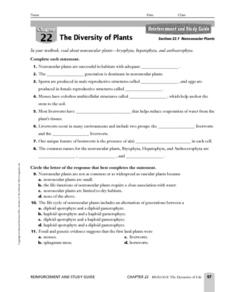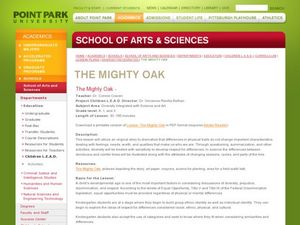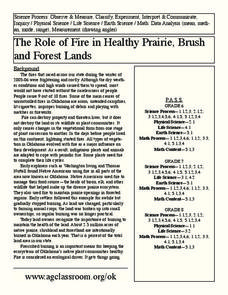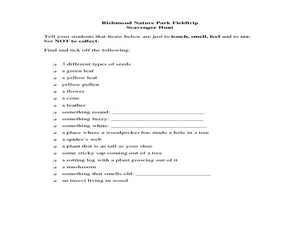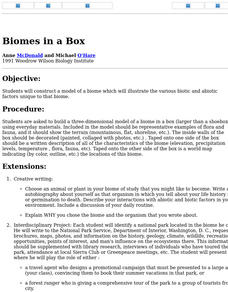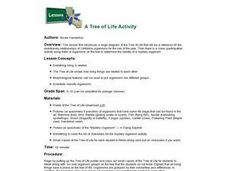Curated OER
Basic Needs of Plants
Fourth graders explore the four basic needs of plants. They examine plants as they grow. Students discuss the changes that they see in the growing plants. They observe what happens to a plant when one of its basic needs is taken away.
Curated OER
Humane Science Projects
In this science worksheet, students examine the list of possible science projects. They look for the characteristics that set apart these ideas as humane.
Curated OER
Animal Diversity
Students explore biology by completing science worksheets in class. In this animal anatomy lesson, students read the book The Adventures of Marco and Polo and identify the animals mentioned in it. Students examine a real life animal and...
Curated OER
And the Rains Came Down: A South American Rainforest
Students examine the characteristics of a South American tropical rainforest. They analyze maps, develop graphs, listen to the book, The Great Kapok Tree, and create a rainforest mural.
Curated OER
Living vs. Non-Living Things
Fourth graders describe the characteristics that determine if something is living, dead, or non-living. They determine the difference between living and non-living things. Students determine if an object is living or non-living and...
Curated OER
Alive or Not
In this organism instructional activity, students review the characteristics that determine if something is alive or not. This instructional activity has 5 fill in the blank and 7 matching questions.
Curated OER
Habitats and Deep Sea Environments
Students examine and identify the characteristics of the four zones of the ocean. They discover the amount of diversity in marine habitats. They also explore the adaptations organisms have that have allowed them to survive.
Curated OER
From Corn To Tortillas
Students investigate the food known as the tortilla. They research the growth cycle of the corn plant and how tortillas are made from it. The importance of the tortilla according to the Hispanic culture is explained to the students. The...
Curated OER
Nonvascular Plants
In this nonvascular plant worksheet, students compare the characteristics of bryophyta, hepatophyta, and anthocerophyta. This worksheet has 8 fill in the blank and 3 multiple choice questions.
Curated OER
Non-Seed Vascular Plants
In this non-seed vascular plant worksheet, students review the characteristics of sporophytes, lycophytes, sphenophytes, and pterophytes. This worksheet has 19 fill in the blank, 4 true or false, and 2 short answer questions.
Curated OER
Fungus Among Us- Non-Fiction Reading Comprehension Worksheet
In this fungus non-fiction reading comprehension worksheet, students read a 3 page selection that describes the characteristics and life of fungi. They answer 10 questions based on the reading which include true or false, multiple...
Curated OER
The Mighty Oak
Students investigate types of trees. In this forestry lesson plan, students read the book The Mighty Oak and act out the story with a partner. Students discuss the types of trees in the book and plant an oak tree on school grounds.
Curated OER
The Role of Fire in Healthy Prairie, Brush and Forest Lands
Students create a Venn diagram to compare and contrast wildfires and prescribed fires. In this earth science lesson plan, students conduct a series of experiment to explore fire characteristics. They describe favorable conditions to...
Curated OER
Richmond Nature Park Field Trip
Students identify different plants and their uses by attending a field trip. In this Canadian plant lesson, students explore the great outdoors of Vancouver, B.C. and discuss the uses of plants by the Native Americans that once resided...
Curated OER
Exploring Limu Diversity
Students explore limu diversity. In this ocean ecosystem lesson, students classify limu according to its physical properties. Students work in small groups to generate scientific observations and sort limu by characteristics.
Curated OER
Algae Experiments
Students describe the characteristics of algae. In this biology lesson, students perform a series of experiment to explore algae. They investigate the basic things algae need to survive.
Curated OER
Seahawk Educational & Environmental Discovery Program
Learners identify and describe local poisonous plant/animals. They compare characteristics of three local ecosystems and describe common plants from different ecosystems; comparing shapes, colors, textures, and measuring sizes.
Curated OER
WONDERFUL, WATERFUL WETLANDS
Students list characteristics of wetland and describe the functions of a wetland.
Curated OER
Dinosaurs
Young scholars research and identify the characteristics of a variety of dinosaurs. They participate in a class discussion about dinosaurs, analyze and examine fossils, and conduct research using a variety of sources to write and present...
Curated OER
Biomes in a Box
Middle schoolers construct a three-dimensional model of a biome which illustrates the various biotic and abiotic factors unique to that biome. They use everday materials to represent the important characteristics of a particular biome...
Curated OER
Biodiversity in Illinois-Pond Habitats
Second graders construct a pond habitat in the classroom using a small swimming pool partially filled with water, real cattails, a tree log adjoining, and plastic animal life appropriate to a pond setting. They examine the frog in detail...
Curated OER
A Tree of Life Activity
High schoolers solve a mystery of the identification of a unknown organism by comparing its morphological characteristics to those in a tree of life classification poster. They compare the observable characteristics of the specimen and...
Curated OER
Smallest Thing
Students compare characteristics of myobacteria and viruses to determine which is the smallest life form. They read and discuss an article that presents different viewpoints on the definition of life to determine their own viewpoint.
Curated OER
Pio, Pio, Que Frio
Students investigate the characteristics of living things. They determine that different organisms have different needs and describe and compare them. They draw and verbally respond about their favorite animal.
Other popular searches
- Edible Plant Characteristics
- Animal Plant Characteristics
- 3 Plant Characteristics
- Land Plant Characteristics
- Characteristics of Plant Cells










